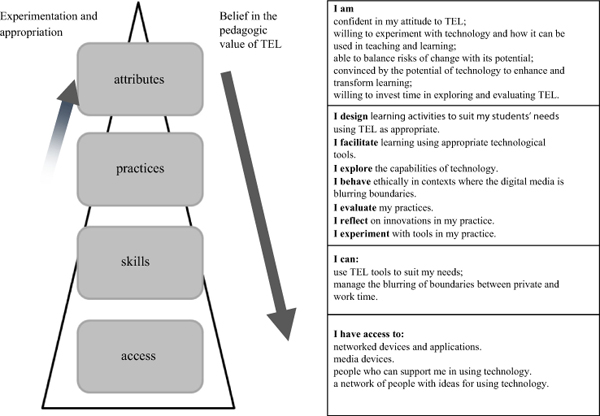Learning from the Early Adopters
Recent research by Liz Bennett (2014) looks at the drivers that motivate educators to use technology in their teaching. She took a framework (Beetham and Sharpe 2011) used to model students’ digital literacies and applied it to lecturers’ digital literacy practices. The intention was to examine the motivations for lecturers in adopting Technology Enhanced Learning.
Bennett found that lecturers were mainly motivated by a desire to achieve pedagogical goals and to support improved outcomes for their students in their learning, rather than by a desire to become digital practitioners and ‘self-actualising as digital pedagogues’.
Bennet’s Digital Practitioner Framework (DPF) has four levels:
At the top is the Attribute level, which relates to aspects of the lecturer’s personality that enable them to make use of technology. The ways of working with technology become assimilated into their ways of operating, and become normalised ways of doing things. This assimilation is different from merely identifying a skill set, it is ‘embedded into the lecturers’ values and beliefs’.
At the Practice level, lecturers were using technology to address pedagogical needs, not using technology for its own sake.
At the Skills level lecturers reported a detailed knowledge of how technologies operated, but there were some who felt that their level of skill was not up to that of their students. However, this was not a worry because while their skills may have been lacking, their relationship with students could counteract this. The lecturer’s role is one of teacher and researcher, and they have the subject area expertise. This is what the students expected of them for their part of the relationship. Lecturers could admit to students that they have a lack of technical knowledge, because they are not technologists. This allows them the space to explore and try out technologies with their students who understood that it was being done for the enhancement of their learning.
The deficit model is often used to explain the lack of engagement with technology - it is the lack of skills that is the barrier. However, in this research skills did not seem to be the main barrier to the uptake of technology, rather it was the perceived usefulness of the technology.
At the Access level lecturers acknowledged that there was need to invest time in learning about new technologies, and that it meant new ways of working. There was an acceptance of a blurring of boundaries between between home and work. This was dealt with by strategies to manage the expectations of students about when they would be available online.
The implication of this research (caveats about the small scale aside) for the way in which digital technologies are promoted and developed in education is that it emphasises the need to concentrate on how technology can enhance teaching and learning rather than on technology for its own sake. The Digital Practitioner Framework provides a way to begin to engage lecturers who are not using technology or who are sceptical - encouraging and supporting practices builds confidence and skills in using technology and develops attributes.
References
Beetham, H. & Sharpe, R. (2011) ‘Digital literacies workshop’, Paper presented at the JISC Learning Literacies Workshop, Birmingham [online], Available at: http://jiscdesignstudio.pbworks.com/w/page/40474566/JISC Digital Literacy Workshop materials
Bennett, L. (2014). Learning from the early adopters: developing the digital practitioner. Research in Learning Technology, 22.

No comments:
Post a Comment